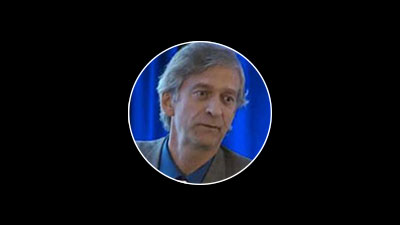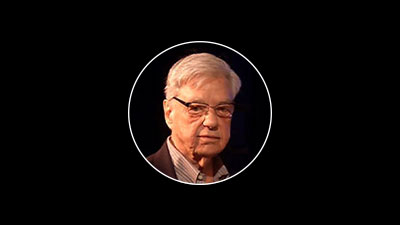 Volume 14, Number 1 – 1/15/11FUTURE FACTS – FROM THINK LINKS Volume 14, Number 1 – 1/15/11FUTURE FACTS – FROM THINK LINKSDID YOU KNOW THAT… A paper published by the University of Manchester and Indiana University showed that the number of emotional words on Twitter could be used to predict daily moves in the Dow Jones Industrial Average.The earth’s magnetic pole is slowly heading toward Russia (at almost 40 miles per year), according to scientists.Polymer threads coated with stem cells might one day heal damaged cardiac muscle.The Dimitrie Leonida National Technical Museum in Romania hosts a battery that has run continuously since 1950. PUNCTUATIONS by John L. Petersen Welcome to 2011! All indications point to this being a very interesting year. Here are a couple of things that have come my way in the last couple of days that point toward a new configuration of the familiar landscape. CYBEREVOLUTION Tom Burgin sent along an interesting piece in FORBES by Jeffrey Carr on the fall of the government in Tunisia and the role of the Internet in providing the communications platform for that upheaval. I’d recommend this to you. Then my friend DK Matai at ATCA posted this fascinating summary of the same event: Tunisia: A Digitally Driven Leaderless Revolution Revolution in The Air World watches nervously as protests bring down a government and force its longstanding leader into exile.  Digitally Driven Revolution Extremely Fast Moving 21st Century Revolutionary Dynamics WikiLeaks exposure of corruption in Tunisia confirms public distrust Out of control food inflation becomes an accelerant to smouldering discontent Spark of the first few food and anti-corruption riots flickers out of control Amplification of riots by mobile telephones, blogs, Facebook, Twitter and Youtube Rapid evolution of self-assembling dynamic networks in streets enabled in digital space Proliferation of food riots in different towns and cities across the country Digital incubation and catalysis of disgruntlement over two to three weeks Large scale mass protests erupt in capital overwhelming fears of government reprisal Spontaneous combustion in under 48 hours President flees and revolution gathers momentum 24/7 Digital Incubators and Catalysts Self-organising communication systems facilitate self-assembling dynamic networks without the need for individual leaders;Mobile telephones communicate global news, immediate local news, peer-to-peer text messages, multimedia video, voice and images;Protesters use Blogs, Facebook, Twitter, Wikileaks documents, YouTube and other digital tools to organise, mobilise and report;Facebook and Twitter mean that a mass of information and intelligence, not always reliable, is integrated about events even in remote parts of the country;Web based email and 24/7 local and international news;Flat screen multi-channel worldwide television gives 24/7 live coverage of events; andInformation and intelligence picked up inside and outside a country may readily intertwine with events in neighbouring countries or elsewhere. Copy Cat Digital Infections What are the chances of worldwide copy cat digital infections via self assembling dynamic networks?This digitally driven leaderless revolution has demonstrated a prototype which has been watched by peoples everywhere in the world;Points to vulnerability of authoritarian regimes not only in the Arab world but also amongst other critical powers; andMost vulnerable to digitally driven leaderless revolutions are undemocratic countries, in such diverse places as the Islamic world and China, North Korea, Burma and Central Asia. Underlying Causes This 21st century digital revolution is not driven by irreconcilable tribalism, religion, abuse of human rights or gender; andThis is about corruption, extremely high unemployment, out-of-control food and fuel prices and the disruption of the daily lives of ordinary people. Background: Spreading Food and Fuel Riots Tunisian protests began when unemployed graduate set himself on fire after his fruit and vegetables stall was confiscated;Food prices are now at an all time high, and are trending higher, indicating that this may be only the beginning of the food riot problem;Surging food and fuel prices are sparking skirmishes and riots across the world;Outbursts ignite concern that the world is due for a repeat of the 2008 food protests that rocked countries as far apart as Haiti, Senegal and Bangladesh;China and India, like much of emerging Asia, are grappling with an escalating inflation problem. That problem is rising food costs which are disproportionately hitting the lower to middle income Chinese and Indian consumers; andRising food and fuel inflation has sparked violence across the Middle East, Africa and Asia as well as South America over the last few weeks, as demonstrators protest the high cost of staple commodities like sugar, corn and rice as well as fuel. Conclusion Digitally driven leaderless revolutions have potential to generate chaos. I’m told that protests are starting in Jordan and other Muslim leaders are concerned about this trend. So, do you see the symmetry with the last communication revolution? The last time technology came along and changed the essence of how human beings communicated ideas was when Gutenberg invented his movable type and mass-production books showed up. People began to become aware of and learn things that were impossible before. What happened then? Well, it was the beginning of the end of the predominance of the then governing entity, the Roman Catholic Church. All kinds of new religions and governments sprung up because there was significantly increased transparency. So now we’ve got the transparency of Twitter, Facebook, YouTube and WikiLeaks and we are watching the same kind of uprising by the people against oppressive governments. Governments (and big corporations, unions, universities and other organizations, for that matter) have two ways to respond to this increased transparency: 1) realize that they’ve got to do business in a way that will withstand the illumination of increased sunshine or, 2) strengthen their control and defences to try to assure that these kinds of cyber evolutions don’t happen to them. Now, you tell me, how will most governments respond to this? I don’t think it will work. The cat’s out of the bag. People now know what they can do. We’re into really new space that could quite literally engender the social underpinnings for a world that operates in a new way. Perhaps we’re seeing the birth of a new world. Kinda neat, don’t you think? FINANCIAL DISRUPTION There is other systemic change in the works. In the financial arena rather amazing behavior has emerged from all parties to process. Chris Martenson’s admonition is Don’t Worry; They’ll Just Change the Rules. Chris explains how that the banks, the government, the Fed and the press are all complicit in systematically ignoring the fact that there is a gigantic pool of very rapidly growing assets held by the Fed that are essentially uncollectable – that the US is hurtling towards bankruptcy. All the players (with a couple of individual exceptions like Congressman Ron Paul and economist Thomas Sowell) are pretending that it doesn’t exist . . . and in the process the system muddles along, essentially waiting for the charade to be exposed. Might WikiLeaks have a role to play here? Might it shed light on the internal inconsistency of this system and facilitate its demise? This is a fascinating study of social behavior in the face of extraordinary change. Rather than honestly assessing the system and adapting – changing behavior – many, if not most, people would rather cast a blind eye at the problem and hope that it goes away. Well, this one’s not going away. In fact, the tea leaves suggest that the path we’re on will likely lead to the inevitable bankruptcy of the country – there’s no way out. Here’s the logic from Gonzalo Lira who explains Why Democracies Will Always Go Bankrupt. CLIMATE CHANGE Want some more change this year? Here’s another big one. A couple of days ago, every state in the US except Florida had snow. Does that suggest something? Tom Burgin again provided this: Been getting into the science of what our English pal Piers Corbyn has been using to predict weather. He uses solar wind as core event and lunar infractions with sun spot and other solar activity such as magnetic storms and their direct influence on the planet. It’s really interesting. Next three years winters will be violently cold. Cooler weather till 2036 – almost a mini ice age to that turning point. Data Verifies hypothesis and examines his past record (20 years) This guy is on to something. Suggests migration to high altitude zone on the equator, as earthquakes, extreme weather and other events are gonna be rather heavy if this model turns out the way it seems to be suggesting. Oh and get some nice warm coats!! East coast weather not gonna be pretty down ur way … You can pay him for his services and some agricultural companies have made vast fortunes out of following his advice. It’s not 100% but 84.46 is a darn site better than the 12% the loony global warming nuts can muster….. Makes u think!! Well, enough good news. Listen, I don’t send these things along to frighten you, but rather to make you aware that change is coming so that you can prepare. How can you get ready if you don’t know? If you’re not aware and anticipating these kinds of things, you’ll be surprised – and these surprises are so big that responding after the fact will be very, very hard and painful. Chris Martenson has a bunch of stuff on physical preparation. Of course, I suggest you also work on your personal self as all of this change is not just political, economic and climatic. A significant aspect of adapting to the shift is becoming someone new – a new human – seeing yourself and the larger context through a new lens. It’s an extraordinary opportunity – and imperative == for personal development. INSTITUTIONAL CHANGE Hedge Fund Will Track Twitter to Predict Stock Moves – (Bloomberg – December 22, 2010) The Derwent Absolute Return Fund Ltd., set to start trading in February with an initial 25 million pounds ($39 million) under management, will follow posts on the social-networking website. A trading model will highlight when the number of times words on Twitter such as “calm” rise above or below average. A paper by the University of Manchester and Indiana University published in October said the number of emotional words on Twitter could be used to predict daily moves in the Dow Jones Industrial Average. A change in emotions expressed online would be followed between two and six days later by a move in the index, the researchers said, and this information let them predict its movements with 87.6% accuracy. Link to original academic study. A World after WikiLeaks – (BBC News – December 16, 2010) Prediction: things will be different after WikiLeaks, but not in ways we might expect. We have called forth the network age, and yet carried on in our daily lives as if nothing has really changed. what really matters is that the disruptive power of the internet has been conclusively demonstrated, and the old order has been provoked to respond. This is democracy’s Napster moment, the point at which the forms of governance that have evolved over 200 years of industrial society prove wanting in the face of the network. Napster was neutered by court action in the US, but its failure inspired peer-to-peer services that were far harder to control. The sharing of music is now unstoppable, and Wikileaks and the organizations that come after it will ensure that the same is now true of secrets. NEW REALITIES Science Observes Water Acting Weird – (Daily Galaxy – December 24, 2010) Exotic new states of water caused Harvard researchers to question what we really know about one of the most common and abundant substances on the planet. First there was the discovery that you can actually burn salt water if you zap it with just the right radio frequency, fueling hopes that plain old seawater could someday be converted to abundant clean energy. Now researchers are finding that water forms a floating bridge when exposed to high voltages. Other researchers also recently discovered that you can make water stay frozen at very warm temperatures if you coat it with a special diamond mixture. Magnetic North Pole Shift Affects Tampa Airport – (AOL News – January 7, 2011) The earth’s magnetic pole is slowly heading toward Russia at almost 40 miles per year, according to scientists, but one of the places this is affecting is the Tampa Airport. Airport officials closed the main runway for a week to adjust the taxiway signs taking into account the magnetic shift based on FAA request. Planck Telescope Observes Cosmic Giants – (BBC News – January 11, 2011) The Planck space telescope has identified some of the largest structures ever seen in the Universe. These are clusters of galaxies that are gravitationally bound to each other and which measure tens of millions of light-years across. Astronomers say the Planck observatory has made more than 20 detections that are brand new to science and has confirmed the existence of a further 169 galaxy clusters. “The clusters contain up to a hundred galaxies, and each galaxy has a billion stars,” said Dr Nabila Aghanim of the Institut d’Astrophysique Spatiale in Orsay, France. Mammoth Could Be Reborn in Four Years – (Telegraph – January 17, 2011) Previous efforts in the 1990s to recover nuclei in cells from the skin and muscle tissue from mammoths found in the Siberian permafrost failed because they had been too badly damaged by the extreme cold. But a technique pioneered in 2008 by Dr. Teruhiko Wakayama, of the Riken Centre for Developmental Biology, was successful in cloning a mouse from the cells of another mouse that had been frozen for 16 years. Now that hurdle has been overcome, Akira Iritani, a professor at Kyoto University, is reactivating his campaign to resurrect the species that died out 5,000 years ago. GENETICS/ HEALTH TECHNOLOGY/ BIOTECHNOLOGY Cause of Male Baldness Discovered – (BBC News – January 4, 2011) Experts say they have discovered what they believe is the cause of male pattern baldness. It is not simply a lack of hair, but rather a problem with the new hair that is made. A manufacturing defect means the hair produced is so small it appears invisible to the naked eye, giving the classic bald spot or receding hairline. The US team said the fault lies with the stem cells that make new hair. It may be possible to cure male baldness by restoring the normal function of these cells, the experts hope. Ultimately, they hope to be able to develop a cream that could be applied to the scalp to help the stem cells grow normal hair. Cell-Seeded Sutures to Repair the Heart – (Technology Review – December 16, 2010) Over the last decade, scientists have experimented with using stem cells to heal or replace the scarred tissue that mars the heart after a heart attack. While the cells do spur some level of repair in animals, human tests have resulted in modest or transient benefits at best. Now researchers have developed a new kind of biological sutures, made from polymer strands infused with stem cells, that might help surmount two major obstacles to using stem cells to heal the heart: getting the cells to the right spot and keeping them there long enough to trigger healing. Alzheimer’s Blood Test ‘Fishes’ for Signs of Disease – (BBC News – January 6, 2011) A new technique could lead to a blood test for detecting Alzheimer’s, a US study claims. The small trial used thousands of artificial molecules to “fish” for the disease. Researchers hope to use this method to diagnose other diseases earlier, including lung and pancreatic cancers. The Alzheimer’s Research Trust said it could result in a new test, but more research was needed. The technique relies on the immune system’s ability to recognize foreign material. Safer Joint Replacements – (Technology Review – December 13, 2010) Infections resulting from joint-replacement surgeries are costly and potentially deadly. Now researchers at MIT are developing coatings for medical implants that can be loaded with multiple drugs, including antibiotics that are released over time. The process involves layering antibiotic films, which are released over the short term, onto a permanently antibacterial polymer designed to prevent infection over the long term. ENVIRONMENTAL ISSUES/CLIMATE Shift in Earth’s Orbit Transformed ‘Green Sahara’ into Planet’s Largest Desert – (Daily Galaxy – December 22, 2010) The Sahara, the world’s largest desert, was once fertile grassland. This fact has been common knowledge in the scientific community for some time, but scientists are still grappling with historic data to determine whether that transition took place abruptly or gradually. Changes in the Earth’s tilt are believed to have made the Sahara go dry. While scientists are still trying to find out if the slow shift in orbit had rapid or gradual environmental consequences, they say Earth’s orbit will continue to change today and into the future. Scientists Engineer Thunderstorms over Abu Dhabi – (Natural News – January 16, 2011) In Abu Dhabi, scientists have successfully manipulated entire weather systems, causing up to fifty downpours of rain across the Al Ain region the desert nation over the last year. A team of scientists working for Sheikh Khalifa bin Zayed Al Nahyan, the president of United Arab Emirates, have erected entire fields of giant ionizers to generate waves of negative ions which rise into the lower atmosphere and attract dust particles. The dust particles, in turn, attract condensation from the ambient air, and when enough condensation is achieved, the clouds can’t hold the water anymore and a downpour of rain is unleashed. The whole system was devices by the Swiss company, Metro Systems International. The Gulf of Mexico is Dying – (Global Research – December 26, 2010) Beneath the opening emotionalism, the geological explanations are complex and worth the time needed to examine them. Although the many deductions may be difficult for the layperson to apprehend at first, to the trained eye there are inescapable conclusions which are simply the result of cause and effect. In other words there is no dispute around the most serious geological changes which have occurred, and continue to occur, in the region around the Macondo wells. The original predicament (an 87 day gushing well) was extremely serious and, although the well has been capped, the larger existing situation is becoming progressively worse. Aflockalypse or Normal Mass Bird Deaths? – (Gather – January 7, 2011) It’s being called an aflockalypse. The stories about mass animal deaths began getting visibility on New Year’s Eve, when a large flock of red-wing blackbirds fell from the sky in Arkansas. That was followed rapidly by 2 million fish in Chesapeake Bay, 150 tons of Vietnamese red tilapia, and 40,000 crabs in Britain. Not to mention sparrows in China and jackdaws in Sweden. The Christian Science Monitor reports that Federal records indicate there’s a mass animal death akin to the blackbirds about every other day on average in North America. However, other sources are raising the question of government testing as a cause of the bird deaths in Arkansas and neighboring Louisiana. But according to wildlife disease specialist LeAnn White, we’re seeing a fairly standard cluster of mass animal deaths. Earth’s Magnetic Pole Shift Unleashing Poisonous Space Clouds Linked to Mysterious Bird Deaths – (Natural News – January 16, 2011) Here is another hypothesis for the bird deaths: a report from the Russia’s Ministry for Extraordinary Situations (MCHS) warned that the weakening Earth magnetosphere due to the shifting magnetic poles was allowing “poisonous space clouds” to enter deep into Earth’s atmosphere where it is coming into contact with birds. These “space clouds” are called noctilucent clouds, which exist at very high altitudes (roughly 50 miles) and accumulate space dust from micrometeors and other sources. Noctilucent clouds exhibit very high radar reflectivity meaning these clouds create a very large radar signature on weather tracking systems. On New Year’s Even when birds began falling out of the sky in Arkansas, the National Weather Service in North Little Rock documented an unusual phenomenon on their radar monitors. “There are some indications that we’re picking up a non-precipitation target,” said Science and Operations Officer Chris Buonanno at the NWS. He went on to explain that the radar signature definitely was not indicative of a cloud or rainstorm. It was something altogether different. At or around the same time this radar image appeared, birds began falling out of the sky. Central Arkansas Growing Weary of Relentless Tremors – (CNN – December 28, 2010) More than 500 measurable earthquakes have been reported in central Arkansas since September 20, ranging in magnitude from a barely noticeable 1.8 to a very noticeable 4.0 (recorded on October 11), according to the U.S. Geological Survey. Geologists can’t say whether they’ll stop anytime soon. “I think everyone recognizes that there is an increased number of seismic events occurring in and around this area. If you look at the maps, at least circumstantially, there appears to be evidence that they may be related to disposal operations,” said Shane Khoury, deputy director and general counsel for the Arkansas Oil and Gas Commission. “But we also know that this is an area that is historically active.” Land Fizzing Like Soda Pop: Farmer Says CO2 Injected Underground is Leaking – (Canadian Press – January 11, 2011) A Saskatchewan farm couple whose land lies over the world’s largest carbon capture and storage project says greenhouse gases seeping from the soil are killing animals and sending groundwater foaming to the surface like shaken soda pop. The gases were supposed to have been injected permanently underground. Cameron and Jane Kerr own nine quarter-sections of land above the Weyburn oilfield in eastern Saskatchewan. They released a consultant’s report Tuesday that links high concentrations of carbon dioxide in their soil to 6,000 tons of the gas injected underground every day by energy giant Cenovus (TSX:CVE) in an attempt to enhance oil recovery and fight climate change. COMMUNICATIONS/COMPUTING Thought Controlled iPad App – (New Scientist – January 5, 2011) The future lies in thought-controlled interfaces. At least that’s what InteraXon, a tiny Toronto startup, is hoping to convince everyone. One of its prototypes is a modified version of Zenbound, an iPad game that requires players to wrap a rope around wooden models by tilting and moving the device. InteraXon has partnered with designer Secret Exit to produce a demo-only version where movements are instead controlled by wearing a pair of headphones. The headphones are equipped with a pair of sensors that sit against the user’s left ear and forehead, forming a circuit that gauges electrical signals occurring in the brain. The signals are relayed to the iPad through an attached Bluetooth dongle. Alpha brainwaves increase as the player relaxes and beta waves jump while focusing. Getting good at Zenbound is thus not unlike playing golf, InteraXon chief executive Ariel Garten says. What Might Google Do With Data from Chrome OS? – (Technology Review – January 3, 2011) In early December, Google sent out thousands of free laptops as part of a program to test Chrome OS, an operating system that relies on the Internet for all its software applications. Computers running Chrome OS don’t let users download data or install applications. Instead, everything happens in the cloud. So the laptop – called the CR-48 – needs very little storage space, but it requires a constant Internet connection, and it has 3G wireless connectivity built in. The design of Chrome OS changes such fundamental things as where a user’s data resides and how it is managed. It also gives Google access to an unprecedented amount of user data. The company hasn’t said how it will use this information, but some clues can be found in the company’s previous products and in the rights it has reserved in the Chrome OS terms of service. Google makes the vast majority of its billions of dollars of annual income by delivering advertising tailored to its users’ behavior and interests as revealed by their searches, the contents of their e-mail messages, and their browsing history. Chrome OS could take this to the next level. Most Internet Users Willing to Pay for Privacy – (Atlantic – December 22, 2010) If you hate those Internet ads that appear to know your interests, you aren’t alone. Two-thirds of Americans do not want advertisers to be allowed to target ads based on their web browsing history, according to a new poll from Gallup. In fact, 61% care so much about their privacy that they aren’t willing to sacrifice it in exchange for more free content paid for by targeted ads. ENERGY DEVELOPMENTS The Bloom Box: An Energy Breakthrough? – (CBS – February 18, 2010) In the world of energy, the Holy Grail is a power source that’s inexpensive and clean, with no emissions. Over 100 start-ups in Silicon Valley are working on it. One of them, Bloom Energy, manufactures a little power-plant-in-a-box they want to put literally in your backyard. You’ll generate your own electricity with the box and it’ll be wireless. The idea is to one day replace the big power plants and transmission line grid. Twenty large companies have quietly bought and are testing Bloom boxes. The first customer was Google. Four units have been powering a Google datacenter for 18 months. They use natural gas, but half as much as would be required for a traditional power plant. John Donahoe, eBay’s CEO, says its five boxes were installed nine months ago and have already saved the company more than $100,000 in electricity costs. Economic Optimism? I’ll Take That Bet – (New York Times – December 27, 2010) Five years ago, Matthew R. Simmons, (a member of the Council on Foreign Relations, the head of a Houston investment bank specializing in the energy industry, and the author of Twilight in the Desert: The Coming Saudi Oil Shock and the World Economy) and a New York Times columnist entered into a $5,000 bet. Simmons expected the price of oil, then about $65 a barrel, to more than triple in the next five years, even after adjusting for inflation and offered to bet $5,000 that the average price of oil over the course of 2010 would be at least $200 a barrel in 2005 dollars. You probably know which way the bet paid, but the details make for interesting reading. A Battery That Has Produced Energy Continuously Since 1950 Exists in Romanian Museum – (IB Times – December 27, 2010) The Dimitrie Leonida National Technical Museum in Romania hosts a weird kind of battery. Built by Vasile Karpen, the pile has been working uninterrupted for 60 years. “I admit it’s also hard for me to advance the idea of an overunity generator without sounding ridiculous, even if the object exists,” says Nicolae Diaconescu, engineer and director of the museum. The invention cannot be displayed because the museum doesn’t have enough money to buy the security system necessary for such an exhibit but it has been exhibited at scientific conferences in Paris, Bucharest and Bologna, Italy. One suggestion is that it runs by extracting energy out of radio waves. The Solar Panels Are Free as Long as You Pay for the Power – (Technology Review – January 5, 2011) How to get photovoltaics on a company’s roof without putting them on the books: a startup called SunEdison is making companies an offer they can’t refuse-employing a financial model that could give solar the edge it needs if it’s to provide a significant portion of the world’s energy. Under SunEdison’s plan, a company gets solar panels on its retail rooftops at no upfront cost and without any monthly equipment fee. Instead, it agrees to pay SunEdison a preset rate for the power the panels generate over a period of 20 years. “The bottom line is that we’re able to purchase solar energy off our rooftops for less than electricity off the grid,” says Mark Buckley, Staples’s vice president for environmental affairs. TRANSPORTATION Ford to Add Automatic Shutoff to All Models – (USA Today – December 27, 2010) Ford Motor has announced that it will add technology to all its conventional cars to shut off their engines at stoplights. The so-called start-stop technology will cut gas use by 4% in most cars, and by up to 10% in vehicles that spend a lot of time idling at stoplights. Every time a driver comes to a stop, the engine will shut off. It will start again automatically as soon as the driver presses the accelerator. The technology puts Ford well on its way to meeting more stringent fuel-economy standards in the U.S. for 2016 that could make the same technology pretty standard on vehicles by most automakers. It’s a cheap way to save more gas – at least compared with hybrids and battery-electric cars. During shutoff, the heater and air conditioner work as normal so drivers will not sacrifice comfort. Mercedes-Benz Unveils Electric Sports Car – (Inhabitat – January 13, 2011) The new supercar features four electric motors. It has a killer kick of 526 hp, 649 lb-ft of torque and is capable of going from zero to 62 mph in just four seconds flat, all features that no one was really paying attention to because we were too busy ogling the jaw-dropping paint job on this sweet ride – a retina-searing electric yellow! The driving program is incredibly flexible, simple and effective. In the Comfort setting, the SLS utilizes just 40% of the motors’ capability and is hyper aware of inputs. In Sport drive, the throttle response gets a bit sharper, and 60% of the power and torque are up for grabs. If you’re feeling adventurous, you can take it a step higher with the vehicle’s highest performance mode: Sport+. With Sport+ you get a super-aggressive throttle and 526 hp, which is the car’s total capacity. An additional mode, Manual, simulates Sport+, but forgoes any use of regenerative braking. NASA unveils extraordinary ideas for the aircraft of 2025 – (Daily Mail – January 17, 2011) NASA has awarded contracts for three concept designs for quiet, energy efficient aircraft that potentially could be ready for flight as soon as 2025. The designs came about after NASA revealed it was aiming to develop a line of ‘super planes’ that are faster, larger, quieter – and burn fuel more efficiently and cleanly than their present counterparts. Criteria set by NASA meant that each design had to fly up to 85 per cent of the speed of sound, cover a range of about 7,000 miles and carry between 50,000 and 100,000 of payload; either cargo or passengers. Check out the photo mock-ups. AGRICULTURE/FOOD U.S. Conspired to Retaliate against European Nations If They Resisted GMOs – (Natural News – December 24, 2010) A recent batch of diplomatic cables released by Wikileaks reveals what can only be characterized as a U.S.-led conspiracy to force GMOs (genetically modified organisms) onto European countries by making those countries pay a steep price if they resist. The cable reveals the words of Craig Stapleton, the US ambassador to France: “Country team Paris recommends that we calibrate a target retaliation list that causes some pain across the EU since this is a collective responsibility, but that also focuses in part on the worst culprits. The list should be measured rather than vicious and must be sustainable over the long term, since we should not expect an early victory…” Renamed Aspartame Certified Organic – ( P Dazzler – December 24, 2010) In 1998, Monsanto applied for FDA approval for a monster molecule, “based on the aspartame formula” with one critical addition: 3-dimethylbutyl [listed on EPA’s most hazardous chemical list]. Neotame is touted as being 13,000 times sweeter than sugar. In 2002, Monsanto’s Neotame molecule was approved by the US FDA over formally registered objections of the Aspartame Consumer Safety Network and others. (Long term effects on humans are unknown.) The food labeling requirements required for aspartame have now been dropped for Neotame, and no one is clear why this was allowed to happen. Neotame has been ruled acceptable, and without being included on the list of ingredients, for: USDA Certified Organic food items and Certified Kosher products. Leaked Memo Sheds Light on Mysterious Bee Die-offs and Whose to Blame – (AlterNet – December 10, 2010) A leaked EPA memo, dated November 2, 2010, focuses on Bayer CropScience’s request to register (i.e. legalize) its pesticide clothianidin for use on mustard seed and cotton. Clothianidin was first registered in May 2003, but its registration was conditional on safety testing that the EPA said should be completed by December 2004. Only, as the latest memo points out, the study, when it was done (long after 2004), was inadequate in demonstrating that clothianidin does not pose a threat to honeybees. Unfortunately, with the EPA’s failure to ensure clothianidin’s safety before allowing its use on corn and canola, it fell to beekeepers to discover why their bees were dying, and how the EPA allowed clothianidin on the market. SECURITY Just Keeping You Safe: The Checka Checks In – (Freedom in Our Time – December 18, 2010) At least one member of the security force of the Department of Homeland Security has, “as a routine matter”, been making unannounced visits to workplaces. Specifically, Mr. Mark Cerchione, whose title according to his business card is “Inspector for Region 10 of the East Command for the Department of Homeland Security’s National Protection and Programs Directorate, Federal Protective Service” paid a visit to a workplace located next to the offices of the Natural Resource Conservation Service, an outpost serving various federal regulatory agencies. Apparently surveillance in the name of national security now extends to examining neighboring businesses as potential threats. It also extends to fear tactics that have been all too common in other countries – see article. Rape Victim Arrested for Refusing TSA Pat Down – (Raw Story – December 24, 2010) A 56-year-old woman who says she is a rape victim and who could not receive a body scan because of a pacemaker was arrested and banned from Austin-Bergstrom International Airport Wednesday after refusing to receive a pat down from a Transportation Security Agency (TSA) officer. The American Civil Liberties Union (ACLU) said it received over 900 complaints from travelers in November who were subjected to the new screening procedures of the TSA. “Under the newly implemented enhanced pat-down, a TSA officer slides his or her hands over an individual’s breasts, buttocks, groin, and inner thighs, and inserts his or her fingers inside the entire circumference of the pant’s waistband,” a lawsuit filed against Homeland Security Secretary Janet Napolitano and TSA administrator John Pistole stated. TRENDS OF GOVERNANCE Obama Administration Readies Indefinite Detention Order for Guantanamo Detainees – (Washington Post – December 21, 2010) The administration has long signaled that the use of prolonged detention, preferably at a facility in the United States, was one element of its plan to close Guantanamo. An interagency task force found that 48 of the 174 detainees remaining at the facility would have to be held in what the administration calls prolonged detention. See also attached “photo gallery” of the prison camps of Guantanamo Bay. The detainee operation began with a makeshift chain-link-fence compound called Camp X-Ray. It has since expanded to seven permanent prison camps, including Camp 7, a CIA-run facility for “high-value” detainees at an undisclosed location on the island of Cuba. Additionally, please see this. GLOBAL RELATIONS Fifteen Facts about China that Will Blow Your Mind – (Business Insider – December 15, 2010) Among those facts: China has about 3.4 million active military personnel compared to America’s 1.4 million. Moreover, in some key spaces, China might even have a tech advantage: “After years of conjecture, details have begun to emerge of a “kill weapon” developed by the Chinese to target and destroy U.S. aircraft carriers. “The size of the missile enables it to carry a warhead big enough to inflict significant damage on a large vessel, providing the Chinese the capability of destroying a U.S. aircraft carrier in one strike. LIFE STYLE/SOCIAL TRENDS AND VALUES Michael Moore Talks WikiLeaks, Assange’s Rape Charge on Rachel Maddow – (AlterNet – December 22, 2010) Michael Moore and Rachel Maddow came together in a meeting of the minds for a special edition of her show. They discussed WikiLeaks and his assistance in Assange’s bail, of course. But perhaps most importantly, Moore addressed the accusations that he’s been dismissive of Assange’s rape allegations, amid a firestorm of criticism from those who have felt betrayed and appalled by his dismissal of the charges as “hooey” on Keith Olbermann’s show. In this video clip, he clarifies his position. Minor in Consciousness and Transformation at George Mason University – (George Mason University – no date) The 16-credit undergraduate minor in Consciousness and Transformation is unique to major universities and offers students an enrichment of whatever career path for which they are preparing. It will enable students to discover how awareness, mindfulness, and meaning play a pivotal role in the way that individuals, organizations, and society undergo transformational change. End of Days in May? Believers Enter Final Stretch – (MSNBC – January 3, 2011) A movement of Christians loosely organized by radio broadcasts and websites, independent of churches is convinced by their reading of the Bible that the end of the world will begin on May 21, 2011. To get the word out, they’re using billboards and bus stop benches, traveling caravans of RVs and volunteers passing out pamphlets on street corners. Cities from Bridgeport, Conn., to Little Rock, Ark., now have billboards with the ominous message, and mission groups are traveling in countries from Latin America to Africa to spread the news outside the U.S. CONTACT AND THE EXPLORATION OF SPACE New Zealand Releases UFO Files – (AOL News – December 24, 2010) It’s close encounters of the kiwi kind as hundreds of formerly classified UFO reports, spanning nearly 60 years, have been released by the government of New Zealand. More than 2,000 pages of documents are included in the files which detail encounters by the public, military personnel and commercial pilots. We Exist in One of Many Universes – (Daily Galaxy – December 20, 2010) In the most recent epic study on “pre-Big Bang science” Stephen M. Feeney and colleagues from the UK, Canada, and the US have revealed that they have discovered four statistically unlikely circular patterns in the cosmic microwave background (CMB). The researchers think that these marks could be “bruises” that our universe has incurred from being bumped four times by other universes. If they turn out to be correct, it would be the first evidence that universes other than ours do exist. American Astronomical Society Meeting – (Astronomy – January 13, 2011) Scientists have announced curious things happening within the Crab Nebula (aka M1). Actually, they are focusing on the Crab’s pulsar – a stellar remnant left over from the supernova explosion that created the beautiful nebula. This pulsar emits radiation over broad wavelengths, and astronomers had long considered the pulsar stable in X-rays. So much so that scientists would calibrate their X-ray detectors using the Crab pulsar. It turns out, however, that’s probably not a good idea. Colleen Wilson of NASA’s Marshall Space Flight Center announced that her team has seen the Crab’s energy emission decrease by 7% since 2008. And this wasn’t the only oddity discovered about the Crab. DEMOGRAPHICS Gap Between Rich and Poor in U.S. Drawn Along Geographic Lines – (Bloomberg – December 15, 2010) Douglas Besharov, a professor at the University of Maryland’s School of Public Policy noted, “There used to be a much wider spread of incomes within geographic areas than there is now. There’s much more of a clumping together.” The Washington metropolitan area emerged as the wealthiest and most educated region of the past five years. The only three communities with median household incomes higher than $100,000 are in suburban counties in Virginia. The 10 communities with the highest incomes are located on the East Coast – Maryland, New Jersey, New York and Virginia – with the exception of Douglas County in Colorado. Among counties with median household incomes of less than $25,000, the bottom 10 are in Alabama, Arkansas, Georgia and Kentucky. 200 Years, 200 Countries, 4 minutes – (You Tube – November 27, 2010) On an invisible screen, statistics come to life when Swedish academic Hans Rosling illustrates the relationship between average income and health (longevity) over the last 200 years across 200 developed and developing countries. The Rise of the New Global Elite – (Atlantic – January/February, 2011) Quoting Alan Greenspan: “… in the wake of the recession, high-income individuals, large banks, and major corporations had experienced a ‘significant recovery’ while the rest of the economy was stuck and still struggling.” What we were seeing, he argued, was not a single economy at all, but rather “fundamentally two separate types of economy,” increasingly distinct and divergent. Whether they maintain primary residences in New York or Hong Kong, Moscow or Mumbai, today’s super-rich are increasingly a nation unto themselves. The details supporting the truth of that assessment make this article worth reading. NEW TOOLS/NEW PROCESSES Hany Farid vs. Photoshop – (Business Week – December 29, 2010) Hany Farid, a Dartmouth computer scientist and forensic imaging specialist has come up with a way to tell whether a digital photograph is authentic. All digital cameras have electronic signatures-minute variations of resolution and image compression in the images they produce. Farid and his students received permission from photo-sharing site Flickr to download millions of images and build a signature database of every one of the 10,000-plus digital camera models ever made. To verify a picture, Farid’s system checks it against that database to identify the equipment used. It then looks for any variations in the signature, which would indicate alteration. If the system finds traces of Adobe Photoshop, which also leaves a signature, that’s a sure sign of picture alteration. ECONOMY/FINANCE/BUSINESS Satellite Images of the Ghost Cities of China – (Business Insider – December 10, 2010) The hottest market in the hottest economy in the world is Chinese real estate. The big question is how vulnerable is this market to a crash. One red flag is the vast number of vacant homes spread through China, by some estimates up to 64 million vacant homes. Here are satellite photos of these unnerving places, based on a report from Forensic Asia Limited: city after city full of empty streets and vast government buildings, some in the most inhospitable locations. It is the modern equivalent of building pyramids. $2T Debt Crisis Threatens to Bring Down 100 American Cities – (Guardian – December 20, 2010) Overdrawn American cities could face financial collapse in 2011, defaulting on hundreds of billions of dollars of borrowings and derailing the US economic recovery. Nor are European cities safe – Florence, Barcelona, Madrid, Venice: all are in trouble. New Jersey governor Chris Christie summarised the problem succinctly: “We spent too much on everything. We spent money we didn’t have. We borrowed money just crazily. The credit card’s maxed out, and it’s over.” Alabama Town’s Failed Pension is a Warning – (New York Times – December 22, 2010) The struggling small city of Prichard on the outskirts of Mobile was warned for years that if it did nothing, its pension fund would run out of money by 2009. Right on schedule, its fund ran dry. Then Prichard did something that pension experts say they have never seen before: it stopped sending monthly pension checks to its 150 retired workers, breaking a state law requiring it to pay its promised retirement benefits in full. The situation in Prichard is extremely unusual – the city has sought bankruptcy protection twice – but it proves that the unthinkable can, in fact, sometimes happen. And it stands as a warning to cities like Philadelphia and states like Illinois, whose pension funds are under great strain: if nothing changes, the money eventually does run out, and when that happens, misery and turmoil follow. Are We Committing Economic Suicide? – (William Pfaff Blog – January 5, 2011) As 2011 begins, people still talk about the crisis of the western economy as though we have been the victims of a blight from nowhere. No individual is held guilty for anything. Certainly not the leaders of finance or business who insisted that markets know best, or the political leaders who empowered them. One element in the national suicide attempt was the Virtual Corporation theory, which encouraged the improvisation of essentially ephemeral management entities to exploit specific business opportunities singly or in alliance. Despite its opportunistic advantages, this destructured the national economy. PROVOCATIVE IDEAS Will the Commons Become Tragic? – (Huffington Post – December 27, 2010) In an op-ed piece, Gary Hart observes that it is quite possible that the greatest human challenge in this century will be how or whether we humans can fairly share what belongs to all. Aristotle stated the issue: “… what is common to the greatest number has the least care bestowed upon it. Everyone thinks chiefly of his own, hardly at all of the common interest.” Our economic system is built on the proposition that markets allocate resources best. But what is true of private resources may not also be true of public resources, those we hold in common. It’s Madness – Madness I Tell You! – (Paranormalia – January 12, 2011) Daryl Bem, a highly-regarded Cornell University psychology professor, has described nine experiments that he carried out over the past eight years. The one that attracted the most attention involved getting students to look at a computer screen that showed two curtains and to guess which one had an erotic image behind it. In fact both spaces were blank, and the image was randomly assigned by the computer after the subject had guessed. Bem says that volunteers showed a slight tendency to identify the space with the ‘rewarding’ sexy picture, by a margin of 53%. In trials where the picture held no particular interest the results were the 50% expected by chance. In a parapsychology journal the report might not have attracted much notice. But it has been accepted for publication in the mainstream Journal of Personality and Social Psychology, which makes it earth-shattering, apparently. FOR WHAT IT’S WORTH – articles off the beaten track which may – or may not – have predictive value. The Animal World Has Its Junkies Too – (PJ Online – December 17, 2010) Research scientists have used many animal species in investigating mind-altering drugs, but it may come as a surprise to learn that animals in the wild – from starlings to reindeer – also make use of psychoactive substances of their own accord. In their use of hallucinogenic plants is where animals really go to town. There is evidence from around the world of animals deliberately consuming such plants, and legends about plants used in sacred rituals often include references to animals introducing them to mankind. One such species is the reindeer, which goes to great lengths to search out the hallucinogenic fly agaric mushroom (Amanita muscaria) – the one with the white-spotted red cap that garden gnomes like to sit on. Top 5 Exotic Free Energy Systems – (Pure Energy Systems – January 5, 2011) This website specializes in unconventional or “exotic” modalities such as magnet motors, overunity electromagnetic motors, gravity motors, cold fusion, and vortex technologies. Here are five of the best exotic technologies we’ve found so far, which are closest to the market. JUST FOR FUN Polar Bears Get the Better of Spy Cameras – (BBC News – December 27, 2010) The cameras used for a documentary on polar bears were designed to be as unobtrusive and resilient as possible. For the documentary, “Polar Bear: Spy on The Ice” hi-tech “spy cams” were used to get as close as possible to the bears during summer in the Arctic islands of Svalbard. But while they were built to withstand temperatures as low as -40C, in the end most of the cameras could not cope with the curiosity displayed by their subjects. The video clip puts the situation in perspective. A FINAL QUOTE… Tomorrow is the most important thing in life. Comes into us at midnight very clean. It’s perfect when it arrives and it puts itself in our hands. It hopes we’ve learned something from yesterday. – John Wayne A special thanks to: Kenton Anderson, Diane Brandon, Bernard Calil, Jackie Capell, Kevin Clark, Frank Egan, Kevin Foley, Chas Freeman, Ursula Freer, Kurzweil AI, Jeanne Mozier, Michael Ostrolenk, Diane Petersen, Stu Rose, Cory Shreckengost, Joel Snell, Woody Wodraska and all of you who have sent us interesting links in the past. If you see something we should know about, do send it along – thanks. johnp@arlingtoninstitute.org CONTACT US Edited by John L. Petersen johnp@arlingtoninstitute.org www.arlingtoninstitute.org PRIVACY POLICY: We don’t share your information with anyone. A Vision for 2012: Planning for Extraordinary Change by John L. Petersen Former senator and presidential candidate Gary Hart has said “It should be required reading for the next President.” e-Newsletter Services by eSense interactive(sm) |





































